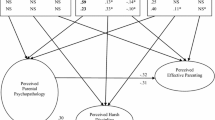Abstract
Parental tolerance has been defined as the degree to which a parent tends to be annoyed by his or her child’s disruptive behavior. The purpose of the current study is to examine the relation of both parent and child gender to parental tolerance of child disruptive behaviors. Participants were 150 parents with 3–6 year-old at-risk children (47.5 % girls) who sought help with parenting of their child’s oppositional defiant behaviors. Tolerance was measured by the difference between parent ratings of intensity on 36 disruptive behaviors and whether each behavior was identified as a problem (resulting in a score of either high, expected, or low tolerance). A 2 (child gender) by 2 (parent gender) analysis of variance was conducted on the tolerance score. A significant interaction between child and parent gender emerged: Mothers were equally tolerant of boys’ and girls’ oppositional defiant behavior but fathers were more tolerant of boys’ than girls’ oppositional behavior. Exploratory analyses suggested that this interaction may be qualified by clinical status of the child. Implications and future directions are discussed.





Similar content being viewed by others
References
Axberg, U., Hanse, J. J., & Broberg, A. G. (2008). Parents' description of conduct problems in their children: A test of the eyberg child behavior inventory (ECBI) in a swedish sample aged 3-10. Scandinavian Journal of Psychology, 49(6), 497–505. doi:10.1111/j.1467-9450.2008.00670.x.
Ayub, S. (2008). Validation of a parental tolerance measure: The child rearing inventory. Masters Theses & Specialist Projects, 24. http://digitalcommons.wku.edu/theses/24.
Brestan, E. V., Eyberg, S. M., Algina, J., Johnson, S. B., & Boggs, S. R. (2003). How annoying is it? Defining parental tolerance for child misbehavior. Child & Family Behavior Therapy, 25, 1–15. doi:10.1300/J019v25n02_01.
Burns, G. L., & Patterson, D. R. (1991). Factor structure of the eyberg child behavior inventory: Unidimensional or multidimensional measure of disruptive behavior? Journal of Clinical Child Psychology, 20, 439–444. doi:10.1207/s15374424jccp2004_13.
Burns, G. L., & Patterson, D. R. (2000). Factor structure of the eyberg child behavior inventory: A parent rating scale of oppositional defiant behavior toward adults, inattentive behavior, and conduct problem behavior. Journal of Clinical Child Psychology, 29, 569–577. doi:10.1207/S15374424JCCP2904_9.
Butler, A. M., Brestan, E. V., & Eyberg, S. M. (2008). Examination of the Eyberg Child Behavior Inventory discrepancy hypothesis. Child & Family Behavior Therapy, 30, 257–262. doi:10.1080/0731700802275637.
Calzada, E. J., Eyberg, S. M., Rich, B., & Querido, J. G. (2004). Parenting disruptive preschoolers: Experiences of mothers and fathers. Journal of Abnormal Child Psychology, 32(2), 203–213. doi:10.1023/B:JACP.0000019771.43161.1c.
Cassano, M., Adrian, M., Veits, G., & Zeman, J. (2006). The inclusion of fathers in the empirical investigation of child psychopathology: An update. Journal of Clinical Child and Adolescent Psychology, 35(4), 583–589. doi:10.1207/s15374424jccp3504_10.
Chaplin, T. M., Cole, P. M., & Zahn-Waxler, C. (2005). Parental socialization of emotion expression: Gender differences and relations to child adjustment. Emotion, 5(1), 80–88. doi:10.1037/1528-3542.5.1.80.
Eyberg, S. M. (1992). Parent and teacher behavior inventories for the assessment of conduct problem behaviors in children. In L. VandeCreek, S. Knapp, & T. L. Jackson (Eds.), Innovations in clinical practice: A source book (Vol. 12, pp. 377–382). Sarasota, FL: Professional Resource Exchange.
Eyberg, S. M., & Pincus, D. (1999). The Eyberg child behavior inventory and Sutter-Eyberg student behavior inventory: Professional manual. Lutz, FL: Psychological Assessment Resources.
Forehand, R., & Long, N. (2010). Parenting the strong-willed child (3rd ed.). New York: McGraw-Hill.
Gryczkowski, M. R., Jordan, S. S., & Mercer, S. H. (2010). Differential relations between mothers’ and fathers’ parenting practices and child externalizing behavior. Journal of Child and Family Studies, 19, 539–546. doi:10.1007/s10826-009-9326-2.
Keenan, K., & Shaw, D. (1997). Developmental and social influences on young girls’ early problem behavior. Psychological Bulletin, 121, 95–113. doi:10.1037/0033-2909.121.1.95.
Kroneman, L. M., Loeber, R., Hipwell, A. E., & Koot, H. M. (2009). Girls’ disruptive behavior and its relationship to family functioning: A review. Journal of Child and Family Studies, 18(3), 259–273. doi:10.1007/s10826-008-9226-x.
Leavell, A. S., Tamis-LeMonda, C. S., Ruble, D. N., Zosuls, K. M., & Cabrera, N. J. (2012). African American, white and Latino fathers’ activities with their sons and daughters in early childhood. Sex Roles, 66, 53–65. doi:10.1007/s11199-011-0080-8.
Loper, M. B. (2006). Further validation of parental tolerance measure. Auburn University. http://etd.auburn.edu/etd/handle/10415/361 (Unpublished manuscript).
McDermott, P. A. (1996). A nationwide study of development and gender prevalence for psychopathology in childhood and adolescence. Journal of Abnormal Child Psychology, 24, 53–66. doi:10.1007/BF01448373.
McMahon, R. J., & Estes, A. M. (1997). Conduct problems. In E. J. Mash & L. G. Terdal (Eds.), Assessment of childhood disorders (3rd ed., pp. 130–193). New York: Guilford.
McMahon, R. J., & Forehand, R. (2003). Helping the noncompliant child: Family-based treatment for oppositional behavior (2nd ed.). New York: Guilford.
Moon, M., & Hoffman, C. D. (2008). Mothers’ and fathers’ differential expectancies and behaviors: Parent X child gender effects. The Journal of Genetic Psychology, 164(3), 261–279. doi:10.3200/GNTP.169.3.261-280.
Phares, V. (1996). Fathers and developmental psychopathology. New York, NY: Wiley.
Reyno, S. M., & McGrath, P. J. (2006). Predictors of parent training efficacy for child externalizing behavior problems—a meta-analytic review. Journal of Child Psychology and Psychiatry, 47, 99–111. doi:10.1111/j.1469-7610.2005.01544.x.
Russell, G., & Russell, A. (1987). Mother-child and father-child relationships in middle childhood. Child Development, 58, 1573–1585. doi:10.2307/1130696.
Zisser, A., & Eyberg, S. M. (2010). Parent-child interaction therapy and the treatment of disruptive behavior disorders. In J. R. Weisz & A. E. Kazdin (Eds.), Evidence-based psychotherapies for children and adolescents (pp. 179–193). New York: Guilford.
Acknowledgments
The support of the Jennifer McNeil Fund, the Child and Adolescent Psychology Training and Research, Inc., Fund, and the Heinz and Rowena Ansbacher Professorship is gratefully acknowledged.
Author information
Authors and Affiliations
Corresponding author
Rights and permissions
About this article
Cite this article
Wright, A.W., Parent, J., Forehand, R. et al. The Relation of Parent and Child Gender to Parental Tolerance of Child Disruptive Behaviors. J Child Fam Stud 22, 779–785 (2013). https://doi.org/10.1007/s10826-012-9632-y
Published:
Issue Date:
DOI: https://doi.org/10.1007/s10826-012-9632-y




